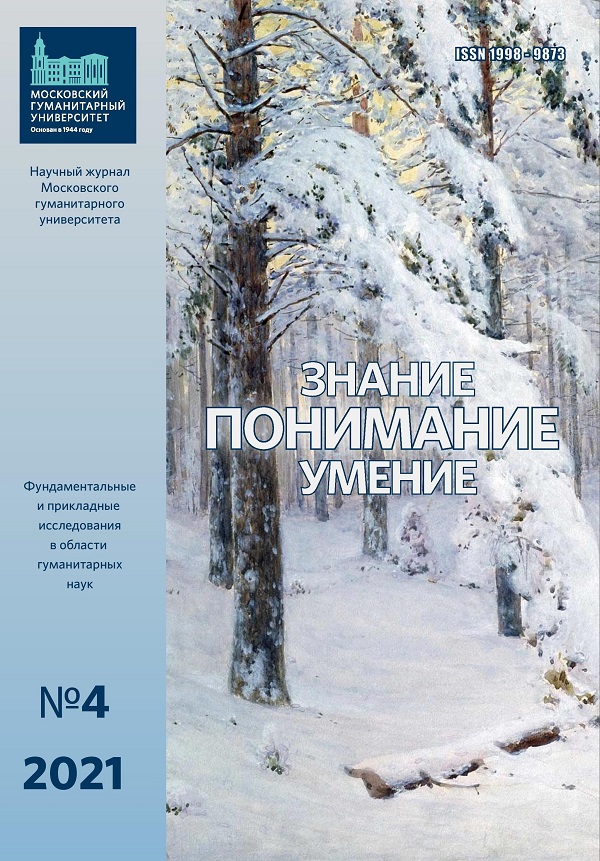Главная / Main Page / "Knowledge. Understanding. Skill" Journal / Contents / 2014 / No. 4
Golovko V. M. Ivan S. Turgenev’s Artistic and Philosophical Interpretation of Freedom and Necessity in the Paradigmatic Context of 20th Century Axiological Ontologism
(North Caucasus Federal University, Stavropol)
Abstract ♦ The article discusses the enrichment of philosophical discourse with artistic philosophizing based on interpreting the binary opposition of "freedom” and “necessity" in Ivan S. Turgenev's "Necessitas, Vis, Libertas".
The poem’s imagery and rhythm is a literary paraphrase of the doctrine of "layers" of the being. The "lower" (Necessity, Power) and "higher" (Freedom) layers of being are symbolized and objectified by means of the personification of abstract concepts. Linking necessity and freedom via power, the writer followed the traditions of construing being as the order of these "layers". Anticipating M. Scheler’s "logic of the heart" and N. Hartmann's aporetics, Turgenev saw freedom as one of the basic forms of being, which belongs to the "higher" layer and is thus not fully determined by the "lower" ones.
Turgenev's characters retain the right for moral choice or at least for striving towards it. Portrait depiction, possessing a certain figurative and expressive power, correspondingly, becomes the main form of revealing his moral and philosophical ideas. Psychologically rich description of Freedom’s appearance captures its ability to reveal itself in free goal-setting. The situation of choice, rather than whimsical arbitrariness, creates an "additional" meaning which Hartmann associated with understanding situation as a field of action, as a part of being and as an actualization of an ethical act.
Turgenev's artistic philosophy is an expression of his original ethics, which is not opposed to his ontology. At the heart of this ethics lies the humanistic principle as the essential property of "living" human spirituality. The question of free will is always at the center of the problem of personality, and thus forms the primary focus of the artist's interest. The existential level of Turgenev’s view of free will anticipates Hartmann's idea of the "human" and "living" as the feature of the "higher" layer of existence. According to this idea, the impact of "ideal" values on the real being happens through man and his freedom. The "category of the living", taken into account by 20th century axiological ontologists in their analysis of the relations between the "lower" and "higher" layers, substantially adjusted the interpretation of man's moral freedom and its specificity. Turgenev's artistic philosophy and Hartmann's and Scheler's axiology stand together in the opposition between the determinism of the real world and the autonomy and self-sufficiency of ideal values, and in interpreting spirituality as a state of being which is historical by its nature.
The interpretation of freedom and necessity by the Russian writer and thinker thus anticipates the views of the ontology of human life expressed by the phenomenological axiology of the 20th century.
Keywords: Ivan S. Turgenev, philosophy of literature, philosophy in literature, ontology, axiology, anthropology, dialectics, freedom, necessity, free will, the doctrine of the layers, moral choice.
Golovko Vyacheslav Mikhailovich, Doctor of Philology, Professor, Department of Russian and World Literature, North Caucasus Federal University; Full member, Schopenhauer-Gesellschaft (Germany); Member, Union of Russian Writers. Postal address: 1 Pushkin St., Stavropol, Russian Federation, 355009. Tel.: +7 (8652) 95-68-00, ext. 42-30. E-mail:
vmgolovko@mail.ru

Citation: Golovko, V. M. (2014) Khudozhestvenno-filosofskaia interpretatsiia svobody i neobkhodimosti I. S. Turgeneva v paradigmaticheskom kontekste aksiologicheskogo ontologizma KhKh veka [Ivan S. Turgenev’s Artistic and Philosophical Interpretation of Freedom and Necessity in the Paradigmatic Context of 20th Century Axiological Ontologism]. Znanie. Ponimanie. Umenie, no. 4, pp. 40–48. (In Russ.).
Submission date: 31.05.2014.
RUSSIAN VERSION
REFERENCES
Hartmann, N. (2002) Etika [Ethics]. St. Petersburg, Vladimir Dal' Publ. 708 р. (In Russ.).
Hartmann, N. (2003) K osnovopolozheniiu ontologii [On the Foundation of Ontology]. St. Petersburg, Nauka Publ. 640 р. (In Russ.).
Hegel, G.-W.-F. (1935) Sochineniia [Works] : in 14 vols. Moscow ; Leningrad, Sotsekgiz Publ. Vol. 8: Filosofiia istorii [The Philosophy of History]. 470 р. (In Russ.).
Golovko, V. M. (2014) Filosofskii diskurs I. S. Turgeneva kak znachimoe tseloe [Ivan S. Turgenev's Philosophical Discourse as a Significant Whole]. Stavropol', North Caucasian Federal University Publ. 252 p. (In Russ.).
Plotnikov, V. I. (2004) Aksiologiia [Axiology]. In: Sovremennyi filosofskii slovar' [Modern Dictionary of Philosophy]. Moscow, Akademicheskii proekt Publ. 864 р. Рр. 17–22. (In Russ.).
Turgenev, I. S. (1967) Polnoe sobranie sochinenii i pisem [Complete Works and Letters] : in 28 vols. Moscow ; Leningrad, Publ. House of the Academy of Sciences of the USSR. Sochineniia [Works]. Vol. 13. 736 р. (In Russ.).
Mackey, L. (2002) An Ancient Quarrel Continued: The Troubled Mar-riage of Philosophy and Literature. Lanham, University Press of America. viii, 283 р.
|
|
 Вышел в свет
Вышел в свет
№4 журнала за 2021 г.
|
|
|
|